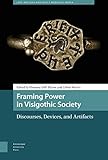Framing Power in Visigothic Society : Discourses, Devices, and Artifacts / ed. by Céline Martin, Eleonora Dell' Elicine.
Material type: TextSeries: Late Antique and Early Medieval Iberia ; 7Publisher: Amsterdam : Amsterdam University Press, [2020]Copyright date: ©2020Description: 1 online resource (224 p.)Content type:
TextSeries: Late Antique and Early Medieval Iberia ; 7Publisher: Amsterdam : Amsterdam University Press, [2020]Copyright date: ©2020Description: 1 online resource (224 p.)Content type: - 9789048543595
- 946.01
- online - DeGruyter
| Item type | Current library | Call number | URL | Status | Notes | Barcode | |
|---|---|---|---|---|---|---|---|
 eBook
eBook
|
Biblioteca "Angelicum" Pont. Univ. S.Tommaso d'Aquino Nuvola online | online - DeGruyter (Browse shelf(Opens below)) | Online access | Not for loan (Accesso limitato) | Accesso per gli utenti autorizzati / Access for authorized users | (dgr)9789048543595 |
Frontmatter -- Table of Contents -- List of Illustrations -- 1. Texts, Discourses, and Devices: Reading Visigothic Society Today -- 2. Presence of Augustine of Hippo in Isidore of Seville : Some Provisional Remarks -- 3. The Bishop and the Word: Isidore of Seville and the Production of Meaning -- 4. Unearthing Peasant Societies : Historiography and Recent Contributions in the Archaeology of the Rural World during Visigothic Times -- 5. Excolentes sacra fontium vel arborum: Pagan Cults, Kinship, and Regimes of Sacralization in the Visigothic Kingdom of Toledo -- 6. Ervig and Capital Penalties: The Way of Exile -- 7. ‘Put All Your Trust in Ansemundus’ : A Look at Distrust in Visigothic- Byzantine Diplomatic Relations -- 8. Visigothic Currency: Recent Developments and Data for Its Study -- Index
restricted access online access with authorization star
http://purl.org/coar/access_right/c_16ec
This volume examines how power was framed in Visigothic society and how a diverse population with a complex and often conflicting cultural inheritance was thereby held together as a single kingdom. Indeed, through this dynamic process a new, early medieval society emerged. Understanding this transformation is no simple matter, as it involved the deployment of an array of political and cultural resources: the production of knowledge, the appropriation of Patristic literature, controlling and administering rural populations, reconceptualizing the sacred, capital punishment and exile, controlling the manufacture of currency, and defining Visigothic society in relation to other polities such as the neighbouring Byzantine state. In order to achieve an analysis of these different phenomena, this volume brings together researchers from a variety of disciplines. This interdisciplinary approach therefore expands the available sources and reformulates topics of traditional scholarship in order to engage with a renewal of Visigothic Studies and reformulate the paradigm of study itself. As a result, this volume rethinks frameworks of power in the Peninsula along not only historical and archaeological but also anthropological terms, presenting the reader with a new understanding of Iberian society as a whole.
Mode of access: Internet via World Wide Web.
In English.
Description based on online resource; title from PDF title page (publisher's Web site, viewed 27. Jan 2023)


